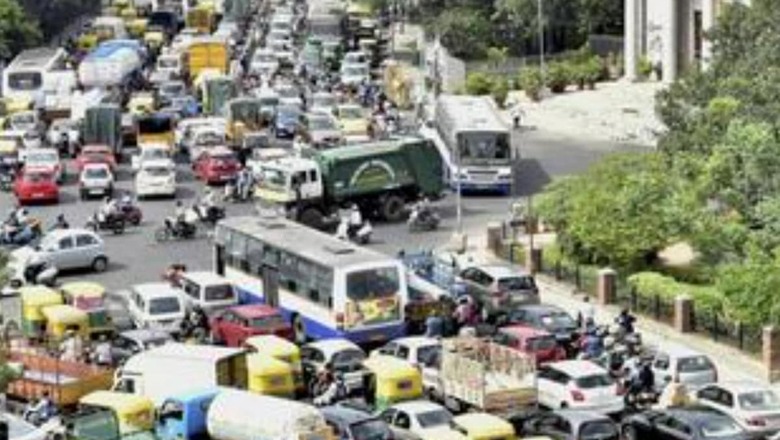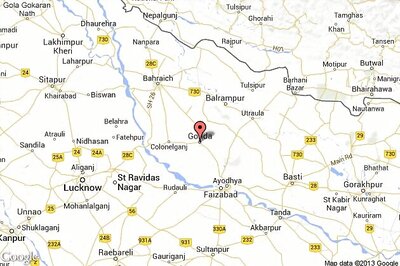
views
Bengaluru’s traffic congestion is notorious and once a techie even rode a horse to work to protest the city’s never-ending traffic woes. Roopesh Kumar Verma certainly “trotted” home a message: ease of traffic to help ease of business.
Now, the Basavaraj Bommai-led BJP government has tabled the Bengaluru Metropolitan Land Transport Authority (BMLTA) Bill, which will constitute an authority to manage traffic congestion, density and mobility in the city, India’s IT capital that has over 10 million vehicles for a population of around 12 million.
The BMLTA will act as a super-authority to regulate and manage traffic in Bengaluru. As of now, it works as an executive committee under the Directorate of Urban Land Transport (DULT), but with the passing of the bill, all key policymaking stakeholders will be brought under one roof and the BMLTA will be given statutory powers.
The bill was tabled in the recently concluded monsoon session of the state legislature and is expected to be taken up for discussion in the winter session.
“It is workable. Bengaluru very much needed a master planning authority that will help plan the city’s traffic mobility and transportation upgradation. The BMLTA has addressed that. This was done after seeking inputs from the public and if they can ensure that it is an independent body and not influenced by any other government agency…They need to ensure that all government agencies dealing with transportation are given equal importance and planning is done well in advance. What the government plans for Bengaluru in the future must be incorporated well in advance so that there is effective implementation,” said urban mobility expert Sanjeev Dyamannavar to News18.
Bengaluru emulates London
Much like the transport for London, where a local government body is responsible for most of the transport network in the city, the BMLTA will be an umbrella body that will consist of 36 members including representatives from key agencies like the Bruhat Bengaluru Mahanagara Palike (BBMP), Bangalore Development Authority (BDA), Bangalore Metropolitan Region Development Authority (BMRDA), and Bengaluru police, for seamless coordination and implementation of traffic rules, infrastructure, and mobility. The Karnataka chief minister will be its ex-officio chairman.
“Whereas multiple institutions or agencies such as Bangalore development authority, Bengaluru metropolitan transport corporation, Bruhat Bengaluru Mahanagara Palike, Bangalore Metro rail corporation Limited and transport department are responsible for planning, developing, implementing and managing activities relating to urban mobility in the above institution and departments are empowered under different legislations to deal with matters relating to urban mobility with a certain framework,” the bill states.
The BMLTA will also chalk out a comprehensive plan to implement sustainable transport systems while integrating efficient land use and transport planning to decongest Bengaluru.
A traffic management plan could be drawn up annually by the super-body to help traffic flow, signal optimisation, corridor, and area-based traffic management plans, etc.
Civic expert Srinivas Alavilli says the BMLTA helps in ensuring that all necessary agencies work together in the larger interest of the public and do not eat into each other’s business.
“The problem in Bengaluru is also that first-mile and last-mile connectivity is not there. BMLTA can address that centrally. Another problem is common ticketing. You have an app for BMTC, a pass for railway, and a smart card for Metro. If you go to London or New York, you buy one transit card and whichever transport you take, you can use the card there. It is common ticketing that helps. BMLTA will bring all of this under one roof. Transport service organisations can focus on their service instead of technology for ticketing just like restaurants today outsource delivery to someone else. Everybody knows Bengaluru has a traffic problem, but nobody understands what the actual problem is in terms of data such as patterns of traffic congestion. BMLTA should help resolve it,” Alavilli tells News18.
What the bill says
Bengaluru’s gridlocked traffic has been attributed to many factors including incomplete infrastructure projects, high dependence on private transport, last-mile connectivity issues with the public transport system, pothole-riddled roads, along with waterlogging due to heavy rains. Years of delay in the completion of mega-projects like metro, suburban rail project K-RIDE, and inadequate bus fleets have also contributed to more private vehicles on the road, thus adding to the traffic congestion.
Since there was no discussion, the bill will either have to be pushed through as an ordinance or wait till December for it to be taken up for discussions.
The BMLTA bill further plans to allow it to “establish appropriate frameworks for engagement of the private sector in planning, development and management of mobility-service delivery and effective contract execution by the urban transport agencies, traffic management agencies and infrastructure development agencies”.
What gives the BMLTA more teeth is allowing the agency to slap hefty fines on violators under the traffic and urban mobility rules that have been framed.
Under the provisions in the bill, it has been proposed that higher fines for traffic violations in the city should be levied.
“If any person fails to comply with the rules, regulations, orders, or directions of the authority, the person shall be punishable with a fine which may extend up to Rs one lakh. For a second or subsequent violation, the fine may be extended to Rs two lakh and in the case of continuing violation or non-compliance with an additional fine which may extend up to Rs 5000 per every day during which the violation or noncompliance continues,” it says.
The BMLTA bill also states that if a department or agency of the state government is seen violating the laws drawn under this bill, the head of that department will be held guilty of the charge. The same would apply to violations by a company, where the person in charge of the company is made “responsible for the conduct of the business of the company, as well as the company, may be deemed liable for the default or contravention and can be liable to be proceeded against and punished accordingly”.
Triple-decker flyovers and skybuses
Along with this, the chief minister had also put out a “master plan” to decongest India’s silicon city. He has plans to build double and triple-decker flyovers crisscrossing across the city that will ease the traffic congestion on the lowest level.
While this proposal was mooted during a meeting with union transport minister Nitin Gadkari on September 9, the plan is still at the proposal stage.
In the same meeting, a proposal to introduce “skybuses” or trolley bus operations in the city was mooted. Gadkari after a detailed meeting with CM Bommai and other stakeholders felt that skybuses could be a solution to decongest Bengaluru’s traffic.
“If we are able to bring one lakh people to travel by skybuses, it will definitely decongest traffic,” the union minister said at the time.
Handling traffic using Google
While the BMLTA bill is waiting to be passed and the plan for triple-decker flyovers and skybuses are in the anvil, the Bengaluru traffic police that has the herculean task of handling the city’s massive traffic on the ground also has been coming up with its solutions. In collaboration with Google, artificial intelligence is being used to track driving trends in the city and provide the traffic police with minute-to-minute revised traffic plans and routes.
“This has reduced the average time a commuter spends on the road, saves fuel, and avoids unnecessary traffic congestion in the city. Google shows the police real-time live road closures across the city and that helps deviate traffic for smoother movement. We also launched speed limits on Google maps and this will help us to deal with overspeeding by vehicles in Bengaluru, digitally,” explained city joint commissioner for traffic, BR Ravikanthe Gowda.
Read all the Latest News India and Breaking News here
















Comments
0 comment